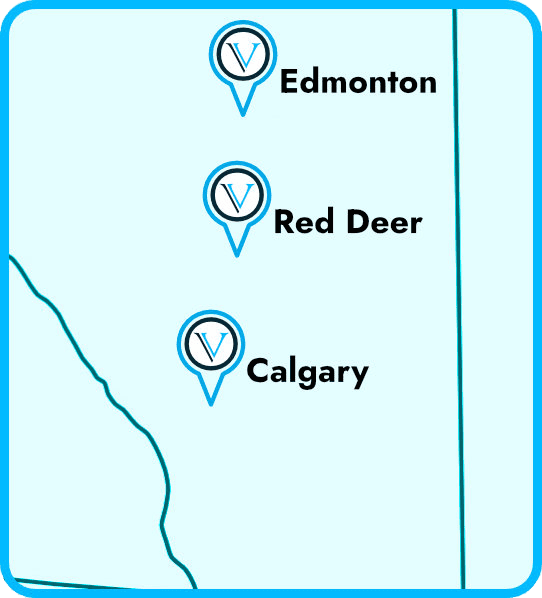
What Happens When Probating a Will in Alberta?
Administering an estate, whether with a will or without, takes time, experience, organization, and patience.
Vest Estate Lawyers offer clients who have been appointed, or who seek appointment as the personal representative, a helping hand to ease the process and hasten distribution of assets to creditors and beneficiaries.
Our lawyers can help you better understand the probate process and provide you with a framework in which to organize your efforts so that the responsibility of serving as a personal representative fits more comfortably on your shoulders.
What is a grant of probate in Alberta?
The will details how a deceased person would like their assets distributed and who should manage the process.
No assets from a will can be legally transferred in Alberta until a court order called the grant of probate has been issued.
It verifies that the will is legal and provides the authority for the personal representative named in the will to transfer assets to the beneficiaries as per the wishes of the deceased.
When is probate required in Alberta?
Most financial institutions require a grant of probate to be produced before they will authorize transfers. It is, therefore, inadvisable for any personal representative to try to circumnavigate the process.
Beneficiaries in the will may become frustrated by the delays involved, but it is a necessary and standard process that just takes a little time.
The government fees for probating an estate are low in Alberta and the process is generally quite straightforward if time-consuming, so there are few good reasons to try to avoid probate.
For the personal representative named in the will, the process reduces the risk of challenges and complications arising later.
Do you have to probate a will in Alberta?
Probate is required when these factors exist:
- There is no surviving spouse as a joint tenant to receive title automatically upon the death of the deceased.
- The assets, especially real estate, are in the name of the deceased only.
- There are substantial funds in bank and brokerage accounts.
- The validity of the will is being questioned, or there is no will.
- The estate is the beneficiary of benefits from registered retirement plans.

Here is where experienced estate lawyers at Vest Estate can really help.
A frank discussion about whether any family members might contest the will is an essential first step in guiding the decision of whether probate is required.
If a will is going to be contested, then the probate process and resulting Grant of Probate protects you as the personal representative from having the Probate Court declare the will valid and that you can proceed as personal representative.
Potential problems when probating an estate in Alberta
The main downside of probating a will is usually the delays that it creates. Other complications can also arise that extend these delays for beneficiaries.
Most commonly, this centres around the following issues:
- Delays due to incomplete or inaccurate information
- Complex estates with extensive third-party requirements
- Certain assets not disposed of in the will (partial intestacy)
- A challenge to the will from family members, beneficiaries or creditors
- Problems with an individual accepting the role of personal representative
- Problems with locating beneficiaries or other parties named in a will
Do you have to go to probate court?
In order to obtain a Grant of Probate which says the will is valid and you are approved as the personal representative of the estate, documents must be submitted to the probate court. These documents include:
- Contact information for the personal representative and lawyers
- Affidavit by the personal representative
- Information on the deceased, the deceased death, and the surviving family
- Details of the will
- Personal representative information
- Beneficiaries
- Inventory of assets and liabilities
- Affidavits of witnesses to the execution of the will
- Notice to beneficiaries of specific gifts within the will
Delay is mostly the result of incomplete or inaccurate filings with the Probate Court. The court reviews all the requested documents and can issue a Grant of Probate without requiring the personal representative to appear in court. That Grant of Probate is legal proof that the will is valid and that the personal representative can act on behalf of the deceased.
How long does probate take in Alberta?
It depends on several factors, some of which depend on the skill of the estate lawyers who prepared the will and those who are helping the personal representative complete the probate process. Complete and accurate submissions are a necessity.
Vest Estate Lawyers knows how to organize the submission of materials to the Probate Court to make the process of obtaining a Grant of Probate less onerous.
The probate process should not be rushed. It is important to get everything right—complete and accurate submissions to the Probate Court—so that the estate is administered accurately according to the deceased person’s wishes and within the law.
GATHERING INFORMATION
The Probate process requires a complete and orderly submission of all relevant documents.
Large complex estates and even small ones can get bogged down when finding all the relevant documents becomes a chore.
Here’s where Vest Estate Lawyers can guide the personal representative to ease the process.
APPLYING FOR PROBATE AND RECEIVING APPROVAL
Once the relevant documents are gathered, they must be submitted to the proper court: the district in which the deceased last lived.
In Alberta, there are fourteen judicial districts, but only one has jurisdiction over your matter.
DEALING WITH APPLICATION PROBLEMS
Incomplete or inaccurate submissions to the probate court can delay issuance of a Grant of Probate.
Once a probate court issues a rejection notice, the personal representative will need to cure the submission and begin the waiting process all over again.
Multiple rejections of the application can drag out the probate process, require additional work and expenses by the personal representative to preserve the assets, and impede distribution of the assets in the estate.
EXECUTING THE WILL IN ALBERTA
Once the Grant of Probate is issued – and, in some cases, the Canada Revenue Agency might require an additional Clearance Certificate – the personal representative can begin to distribute the assets of the estate to creditors and beneficiaries.
This is likely to be a complex task, depending on the size of the estate, the number of beneficiaries, and if there are any creditors.
What happens if a person dies intestate in Alberta?
The probate process is generally necessary when a person dies with a will in Alberta. If a person dies without a will, different rules apply.
In that case, the provisions of the Wills and Succession Act determine what happens to property.
For instance, if you die leaving children but no spouse, everything will be divided equally among your children.
Many of the complexities and delays associated with probating a will in Alberta can be avoided with a careful will plan.
Whether you need to write a will, probate a will as the personal representative, or defend the estate from a challenge, the lawyers at Spectrum Family Law are ready to listen to and advise you of your legal options.
Contact our probate & estate planning team today
The personal representative is legally responsible for an array of tasks: notifying the insurance companies and the financial institutions holding the funds; locating and communicating with all the beneficiaries; paying all debts and obligations under the will; preserving the value of the assets during the probate process; completing tax returns; and distributing the assets.
The personal representative needs to be organized and keep accurate records, tasks that can be guided by experienced Vest Estate lawyers.
We offer you more than a checklist. We offer our clients an overview of the process, problem-solving throughout the probate process, and knowledge of the judges and courts.
If you want to inquire about probate, apply for probate, or begin executing a will in Alberta, the probate experts at Vest Estate Lawyers can help you navigate the responsibilities.

We currently have three offices across Alberta — Edmonton, Calgary, and Red Deer. However, we serve the entire province of Alberta. We also have the infrastructure to work with any of our clients virtually — even the furthest regions of Alberta.
Call us toll-free at 1-877-448-3131 to get routed to the best office for you or contact us online to schedule an appointment.
We also have a dedicated intake form to help you get the ball rolling. Our intake team will review your specific case and advise you on the next steps to take and what to expect moving forward.
Our offices are generally open 8:30 a.m.—5:00 p.m., Mon—Fri.


Sarah Levine
WILLS and ESTATES LAWYER
Sarah Levine is a lawyer in the firm’s Edmonton office. She carries on a varied practice, focusing on all forms of estate planning and estate administration.

